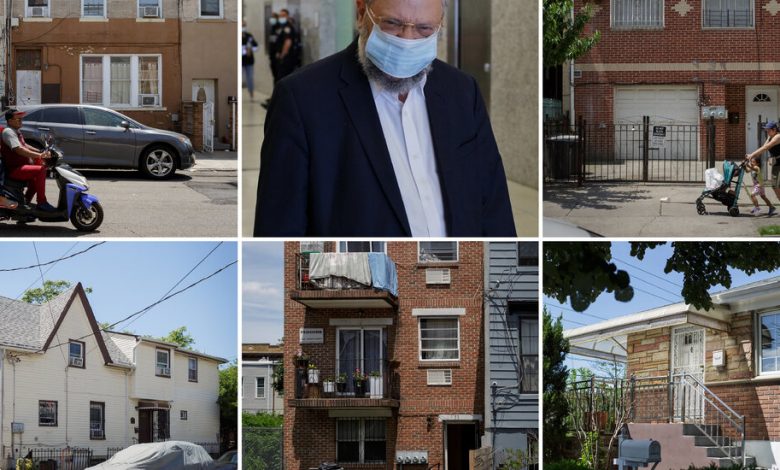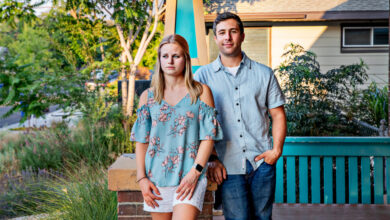He Runs a New York Real Estate Empire. Did He Steal It?

Over the past dozen years, Sanford Solny has built a New York real estate empire, snatching up small residential buildings across the city that churn out hundreds of thousands of dollars in rent.
His portfolio would be enviable but for one thing — much of it, prosecutors and homeowners contend, was stolen. In criminal charges and lawsuits, they have accused him of fraud: offering to help homeowners facing foreclosure by arranging to pay off their mortgages, while actually tricking them into signing over their buildings at bargain-basement prices. In nearly every case, the mortgage was never paid, leaving the homeowner with no property but a pile of debt.
The practice is known as deed theft, and as city and state officials promised to crack down on it, they homed in on Mr. Solny. The Brooklyn district attorney, whose office has charged him with taking the homes of seven families, called his behavior “despicable.” In Queens, prosecutors accused Mr. Solny and his associates of cheating 10 people out of their properties. The court appointed a monitor to scrutinize his transactions.
But an examination by The New York Times has found that not only is Mr. Solny still profiting from buildings under dispute, city agencies are contributing to his earnings by subsidizing the rent at some of his properties.
His case exemplifies the slow and stumbling fight against deed theft, which often targets immigrants and Black and Latino homeowners. Despite repeated pledges from the New York State attorney general and legislature to curtail the fraud, only a small fraction of thousands of complaints are ever prosecuted. Homeowners, stripped of their most significant asset, are left to engage in a long and expensive fight to try to reclaim their properties in civil court.
A close review of Mr. Solny’s holdings and transactions — drawing on housing court cases, lawsuits, city property records and interviews — reveals a long record of questionable dealings and a largely ineffective government response. Over more than a decade, Mr. Solny and companies linked to him took ownership of at least 140 properties, The Times found. The former owners of 40 of those buildings — which include a coveted brownstone in gentrifying Bedford-Stuyvesant, Brooklyn, a three-story apartment building near Rockaway Beach and a suburban Craftsman-style home with a lawn in Rosedale, Queens — have claimed they were victims of deed theft, civil and criminal court records show.
Even while Mr. Solny was under the eye of the monitor, a company controlled by him paid a Brooklyn woman $5,000 for a home worth about 100 times that much and left her family with the debt, according to the woman and city property records.
Through a web of shell companies, Mr. Solny still owns 19 homes whose owners he has been accused of defrauding, and he collects rent from tenants he installed in many of them, according to court filings, city records and interviews. As criminal charges against Mr. Solny have piled up, city agencies have paid the rent of tenants at some of those properties through affordable-housing vouchers, The Times found.
“How does the system work for him and not for us?” said Janet Bruce, a retired home health aide from Guyana who said in court filings that Mr. Solny walked into her home in Flatbush, Brooklyn, in 2014 with a stack of paper and a promise to rescue her and her husband from foreclosure. He gave the couple $14,000 but never paid off their mortgage, she said.
He walked out as the owner of a building now worth about $900,000, said Ms. Bruce, 69, who has sued Mr. Solny. The transaction is also part of the criminal case in Brooklyn.
From July 2014 through February of this year, there were more than 3,350 complaints of deed theft in New York City, almost half of which were in Brooklyn, according to the city Department of Finance. The Brooklyn district attorney’s office brought charges in 27 cases of deed theft since 2014, according to a Times review.
“It just makes you wonder how seriously we, as a society, and our criminal justice system, take white-collar crime that actually victimizes people,” said Oda Friedheim, a supervising lawyer at the Legal Aid Society who deals with property fraud.
A lawyer for Mr. Solny declined to answer specific questions from The Times, citing the open criminal case in Brooklyn.
“The fact that these clients would lose their homes had been a foregone conclusion long before they ever met Mr. Solny,” the lawyer, Michael Farkas, said in a statement. “When they sought his assistance with managing that unfortunate and complex reality, these clients executed documents that clearly conveyed their properties to Mr. Solny.”
Deed fraud complaints in New York City have fallen from a peak of 665 in 2015 to 154 last year. But those numbers mask what could be a looming surge now that protections against foreclosure that were put in place during the pandemic have expired.
“You have a very high number of homeowners that are in distress, and real estate in New York has never been more valuable,” said Ivy Perez, the senior policy and research manager for the Center for NYC Neighborhoods, an affordable-housing nonprofit. “That is a potent combination for scammers.”
‘We Lost Everything’
Deed theft takes different forms, but Mr. Solny is accused of one of the most common.
The fraud preys on people who are in danger of losing their homes, information that is easily obtainable in real estate databases. Some buyers also recruit local residents to find people they know who are in financial trouble.
Homeowners are told they qualify for a short sale — a deal in which the lender settles for less than the amount owed on the mortgage. The owners, already resigned to losing their properties to foreclosure and confused by a mountain of paperwork, believe the deal will at least relieve them of their debt and give them a small amount of cash.
In reality, the documents they sign transfer ownership of the building while still leaving the homeowners responsible for the debt. The person committing the fraud brings in tenants and collects rent, sometimes for years, until banks or other lenders finally foreclose on the property.
Ms. Bruce fell behind on her mortgage payments in 2013, after her husband, James, a plan examiner for the Department of Buildings, had a stroke.
A friend from church referred Ms. Bruce to Mr. Solny, who said he could help arrange a short sale. Mr. Solny told her she would lose the house but the mortgage would be paid, and he would take care of everything as her lawyer, she said in her lawsuit.
Mr. Solny and his associates arrived late, Ms. Bruce said, and then rushed her and her husband to sign documents in separate rooms. He paid them each $7,000, according to the complaint.
No short-sale attempt was made, she said, but a deed transferring the property to East 29th Street Realty Inc. was recorded with the city, records show. Mr. Solny signed as the buyer, and his daughter, Shandelle Solny, signed as a witness. For years, because of assurances from Mr. Solny, Ms. Bruce did not realize that the growing debt would remain in her name, she said. She owes roughly $350,000 — a debt she could pay, with money to spare, if she were able to sell or refinance the home.
Mr. Solny installed tenants shortly after the couple moved out and has collected more than $200,000 from the building, according to Bill Lienhard, a lawyer for Ms. Bruce. Two current tenants confirmed to The Times that they paid rent to a company controlled by Mr. Solny.
“He collects rent until the foreclosure is done, and then he’s out — what does he care?” said Toby Cohen, another lawyer who has represented several people suing Mr. Solny.
Prosecutors say they are hamstrung by the law: They must show there was criminal intent in cases that are not as slam-dunk as those they prefer to bring to court. Years can go by before a homeowner realizes what happened, and the transactions are complicated. What one person claims as fraud can be defended as just a lopsided business deal.
“Deed theft is notoriously difficult to investigate and prosecute,” said Melinda Katz, the Queens district attorney. The sentiment was echoed by Eric Gonzalez, the Brooklyn district attorney.
Civil lawsuits are usually the only way a homeowner can try to reclaim a title, and victims often cannot afford a lawyer. The plaintiffs rarely win — properties once owned by several of Mr. Cohen’s clients were sold at foreclosure auctions to other parties before the cases could be settled.
Litigation is complicated by a web of shell companies controlled by Mr. Solny and members of his family. Of the 140 transactions The Times linked to Mr. Solny, none was personally deeded to him. Instead, he signed as an officer of a corporate entity that assumed ownership.
“We lost everything,” Ms. Bruce said, recalling a period when she slept on friends’ couches and left New York for cheaper housing in Philadelphia. Her husband died in 2020. “Do you know how hard it is to be picking up the pieces when you’re in your senior years?”
No Heat or Hot Water
Homeowners are not the only ones affected. Tenants and city agencies have complained of serious safety and health hazards at buildings owned by companies linked to Mr. Solny.
Of the 19 disputed properties those companies still owned as of June, 15 had open housing violations, including for heat and hot-water failures, unsafe wiring and pest infestations.
“They’re not doing nothing — never have heating, never fix nothing,” said Sandy Triunfel, a home attendant who in 2017 stopped paying rent on her apartment in Crown Heights, Brooklyn, according to court records, because she said she did not receive hot water or gas for months.
The owner, Blue Realty & Services Group, a company tied to Mr. Solny, evicted her the next year. The previous homeowner had claimed in civil court that the company had tricked him into signing over the deed to the home.
At Ms. Bruce’s former home, city inspectors found almost four dozen lead paint violations in February 2019, when a mother and her eight children were living there. After the tenants applied for emergency rental aid, the city paid roughly $21,000 in back rent to Mr. Solny’s company. Two current tenants said the city was still paying some of their rent through subsidies.
It was one of three disputed properties where The Times found the city had covered the rent for Mr. Solny’s tenants. The New York City Housing Authority, which paid subsidies at one of the properties, said it had since added Mr. Solny’s company to a list of banned landlords.
Neha Sharma, a spokeswoman for the city Department of Social Services, which administers the rent assistance program at the other two buildings, said the agency’s priority was to preserve housing stability for tenants.
A Buying Spree
Mr. Solny, 65, who is known as Sandy, has been on the city’s radar for years.
In 2012, he was suspended from practicing law for pilfering $600,000 from his dying uncle, according to a disciplinary board decision. He paid back the money but remains suspended.
The next year, Mr. Solny and his daughter went on a buying spree: at least 50 houses in Queens, Brooklyn and the Bronx, many of which were in or approaching foreclosure. On a single day in March 2013, they signed the deeds to three homes in East New York, a predominantly Black neighborhood in Brooklyn, according to city records.
Tenants and homeowners described him as cordial, with a soft voice and grandfatherly mien.
“He’s very slick,” said Richard Severe, who sued a company controlled by Mr. Solny in 2015 for claiming the title to his two-family home in East New York. The case is open.
In 2016, Mr. Solny and his associates were charged in Queens with crimes related to the theft of 10 homes. He pleaded guilty two years later to a lesser charge of criminal possession of stolen property and was sentenced to up to five years of probation.
Mr. Solny paid a fine and returned rent he had collected, and five deeds were voided as a result of the deal. His daughter, Shandelle, 31, was charged with tax fraud and paid restitution in a plea deal. Ms. Solny declined to comment beyond the statement issued by her father’s lawyer.
In 2020, Brooklyn prosecutors charged Mr. Solny with crimes connected to the theft of eight properties. Following the indictment, Mr. Solny’s probation officer recommended that he be sentenced to prison for violating the terms of his plea deal in Queens. A verdict has not yet been reached in the Brooklyn case.
The Queens deal did not bar Mr. Solny from buying more real estate, but the court appointed a monitor in 2018 to review his business deals going forward and flag any suspicious transactions.
In a review of property records, The Times found a questionable transaction conducted after Mr. Solny’s plea in Queens.
Elizabeth Lewis, 77, a retired bank worker, told The Times that in late 2019, Mr. Solny offered to arrange a short sale on a Brooklyn property, a two-bedroom brick house in East Flatbush belonging to Ms. Lewis’s sister, who had a reverse mortgage and other debt.
Ms. Lewis said she signed paperwork on behalf of her sister, who died in 2020, to initiate a sale. The deed recorded the sale at $35,000, but Ms. Lewis said she was paid $5,000 with the promise of more when the house was sold.
She signed over the deed to a company controlled by Mr. Solny, but the debt was not paid, according to property records and the Department of Housing and Urban Development, which holds the loan.
Comparable sales show the house is probably worth more than $500,000, but Ms. Lewis can no longer sell it because Mr. Solny’s company is listed with the city as the owner.
She has not heard from Mr. Solny in almost two years, she said.
Brian Sanvidge, who has overseen the review of Mr. Solny’s transactions at Anchin, the monitoring firm, said that he had looked at more than 240 properties connected to Mr. Solny and had not caught the East Flatbush sale. He called it “concerning” and said he would report it to the Queens district attorney.
Little Relief
Public efforts have been made to counter property fraud, but critics say the measures fall short.
The state attorney general’s office announced a campaign to fight deed theft in 2020, funding free legal services and mortgage assistance in neighborhoods vulnerable to fraud. But relief for those who have already lost their homes can be difficult to get: The office is currently prosecuting just three deed theft cases.
A state law passed in 2019 included a rule that allows prosecutors to file a motion to void a fraudulent property transfer in connection with a guilty plea or verdict.
But the rule is narrowly defined, limiting its use, and the process can still take years, said Rachel Geballe, a deputy director at Brooklyn Legal Services. Neither Queens nor Brooklyn prosecutors have used the mechanism, although the offices said they had used other means to void fraudulent deeds.
For Ms. Bruce, eight years have passed since she signed her home over to Mr. Solny’s company. The Brooklyn criminal case has been adjourned 13 times since late 2020. Mr. Farkas said in court in June that his client was considering a plea deal.
“I’m hoping some sort of justice will come from this,” Ms. Bruce said. “I say, ‘Lord, when is this going to be over?’”
Susan Beachy contributed research.
Source link






